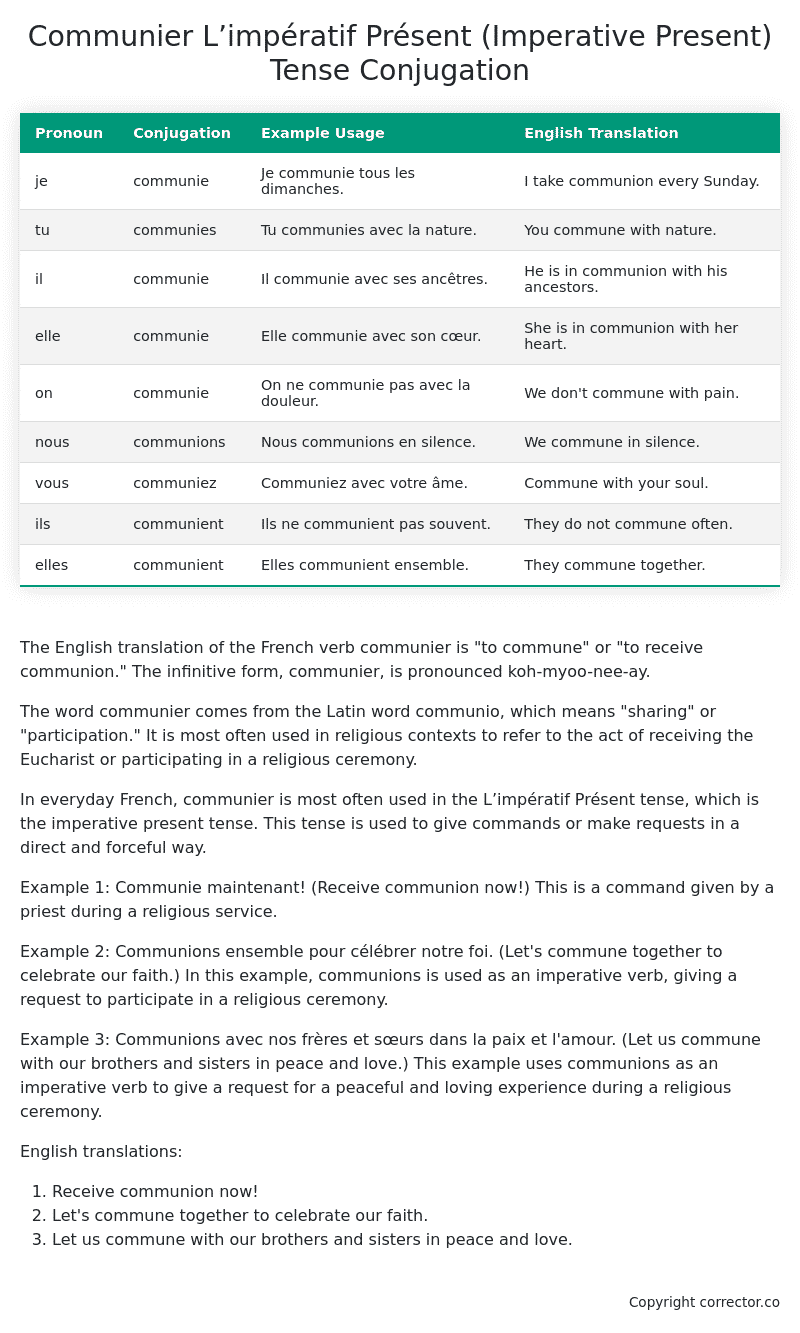L’impératif Présent (Imperative Present) Tense Conjugation of the French Verb communier
Introduction to the verb communier
The English translation of the French verb communier is “to commune” or “to receive communion.” The infinitive form, communier, is pronounced koh-myoo-nee-ay.
The word communier comes from the Latin word communio, which means “sharing” or “participation.” It is most often used in religious contexts to refer to the act of receiving the Eucharist or participating in a religious ceremony.
In everyday French, communier is most often used in the L’impératif Présent tense, which is the imperative present tense. This tense is used to give commands or make requests in a direct and forceful way.
Example 1:
Communie maintenant! (Receive communion now!)
This is a command given by a priest during a religious service.
Example 2:
Communions ensemble pour célébrer notre foi. (Let’s commune together to celebrate our faith.)
In this example, communions is used as an imperative verb, giving a request to participate in a religious ceremony.
Example 3:
Communions avec nos frères et sœurs dans la paix et l’amour. (Let us commune with our brothers and sisters in peace and love.)
This example uses communions as an imperative verb to give a request for a peaceful and loving experience during a religious ceremony.
English translations:
- Receive communion now!
- Let’s commune together to celebrate our faith.
- Let us commune with our brothers and sisters in peace and love.
Table of the L’impératif Présent (Imperative Present) Tense Conjugation of communier
| Pronoun | Conjugation | Example Usage | English Translation |
|---|---|---|---|
| je | communie | Je communie tous les dimanches. | I take communion every Sunday. |
| tu | communies | Tu communies avec la nature. | You commune with nature. |
| il | communie | Il communie avec ses ancêtres. | He is in communion with his ancestors. |
| elle | communie | Elle communie avec son cœur. | She is in communion with her heart. |
| on | communie | On ne communie pas avec la douleur. | We don’t commune with pain. |
| nous | communions | Nous communions en silence. | We commune in silence. |
| vous | communiez | Communiez avec votre âme. | Commune with your soul. |
| ils | communient | Ils ne communient pas souvent. | They do not commune often. |
| elles | communient | Elles communient ensemble. | They commune together. |
Other Conjugations for Communier.
Le Present (Present Tense) Conjugation of the French Verb communier
Imparfait (Imperfect) Tense Conjugation of the French Verb communier
Passé Simple (Simple Past) Tense Conjugation of the French Verb communier
Passé Composé (Present Perfect) Tense Conjugation of the French Verb communier
Futur Simple (Simple Future) Tense Conjugation of the French Verb communier
Futur Proche (Near Future) Tense Conjugation of the French Verb communier
Plus-que-parfait (Pluperfect) Tense Conjugation of the French Verb communier
Passé Antérieur (Past Anterior) Tense Conjugation of the French Verb communier
Futur Antérieur (Future Anterior) Tense Conjugation of the French Verb communier
Subjonctif Présent (Subjunctive Present) Tense Conjugation of the French Verb communier
Subjonctif Passé (Subjunctive Past) Tense Conjugation of the French Verb communier
Subjonctif Imparfait (Subjunctive Imperfect) Tense Conjugation of the French Verb communier
Subjonctif Plus-que-parfait (Subjunctive Pluperfect) Tense Conjugation of the French Verb communier
Conditionnel Présent (Conditional Present) Tense Conjugation of the French Verb communier
Conditionnel Passé (Conditional Past) Tense Conjugation of the French Verb communier
L’impératif Présent (Imperative Present) Tense Conjugation of the French Verb communier (this article)
L’infinitif Présent (Infinitive Present) Tense Conjugation of the French Verb communier
Struggling with French verbs or the language in general? Why not use our free French Grammar Checker – no registration required!
Get a FREE Download Study Sheet of this Conjugation 🔥
Simply right click the image below, click “save image” and get your free reference for the communier L’impératif Présent tense conjugation!

Communier – About the French L’impératif Présent (Imperative Present) Tense
Usage
Giving commands
Making requests
Offering advice
Expressing desires
Conjugation Formation
Interactions with other tenses
Want More?
I hope you enjoyed this article on the verb communier. Still in a learning mood? Check out another TOTALLY random French verb conjugation!


